As the definition of love expands with each passing day, relationships have become more fluid. Open relationships and polyamory are no longer unheard of. However, even the most fluid of relationships need basic ground rules to avoid causing unnecessary pain and misunderstanding. In this article, we bring you answers to questions like, “Can open relationships work?” and “What are some open relationship rules?”
To better understand how open relationships work, we talked to psychotherapist Sampreeti Das (Masters in Clinical Psychology and Ph.D. researcher), who specializes in Rational Emotive Behavior Therapy, and Holistic and Transformational Psychotherapy. Let’s take a look at how to have a successful open relationship.
What Is An Open Relationship?
Table of Contents
Open relationship dating challenges the notion that humans are naturally monogamous. To open up a relationship is to acknowledge that a single partner may not be able to fulfill all your needs — emotional, psychological, logistical, and sexual. Open relationships may often be confused with polyamory. Since both are fluid connections, there are certain overlaps and they’re both tough to define in conclusive terms.
- In most cases, open relationships are understood as involving one primary romantic connection while allowing multiple sexual partners
- A polyamorous relationship, on the other hand, is being emotionally and mentally engaged with multiple people at the same time.
“Open relationship dating is a part of non-monogamy, an umbrella term that comprises any relationship that does not carry a tag of exclusivity.”
That being said, there’s no fixed guidelines on how to be in an open relationship. It’s often up to the parties concerned to set boundaries and define what is an open relationship for them.
What are one-sided open relationships?
One-sided open relationships are about one of the partners being sexually/emotionally involved with other people and the other not doing so. There are several reasons a couple may opt for a one-sided open relationship, such as:
- One partner is incapable of having sex, is asexual or demisexual
- One partner has lost interest in sex after a long marriage
- One partner is polyamorous or wants to explore a same-gender relationship in their heterosexual, monogamous marriage
But one-sided open marriages or relationships also need honesty and a lot of communication because jealousy and possessiveness are bound to creep in.
One-sided open relationship rules demand that the partner who continues in a monogamous relationship should be informed about the other partner’s multiple relationships. If they have reasonable reservations and requests, that should be respected.
The only issue is that one-sided open marriages or relationships could become exploitative when one partner is forced to give consent because they are scared of their partner leaving them or want to keep the marriage intact for their kids. But like all open relationships, one-sided open relationship rules say it is reversible. If the partners see it’s not working, they can go back to being monogamous. That is, of course, if it’s a healthy and respectful bond.
Are open relationships healthy?
Being in an open relationship is not the norm and some naysayers might cringe at the term itself, but open relationships are as healthy as monogamous relationships. They need as much emotional, mental, and physical work as monogamous relationships. There’s trust, passion, fighting, cheating, and breakups in open relationships just like in monogamous ones.
A recent article published in The New York Times, exploring the psychology of open relationships, stated that partners in open relationships experience the same levels of satisfaction, psychological well-being and sexual satisfaction as those in monogamous relationships. Sampreeti points out that any adult, consensual relationship structure that you’re comfortable with and that fulfills your psychological and sexual needs is healthy.
Related Reading: Planning A Commitment Ceremony? Everything You Need To Know
So, are open relationships healthy? Yes. As long as the partners are on the same wavelength and feel similar levels of significant mental, emotional, and sexual satisfaction. Of course, that depends on the open marriage rules or open relationship boundaries you’ve set up.
Can open relationships work?
Yes, if you know how to be in an open relationship without letting dishonesty, jealousy, and fear ruin it. However, before getting into an open relationship, you need to ask yourself if you want your relationship to be open for sexual freedom or is it a way to retreat from your partner. Regular check-ins with your partner, maintaining absolute honesty, and variations of the rules you set before you started can make open relationships as beautiful as you want them to be.

Can an open relationship save a relationship?
A relationship goes downhill because of a lack of communication, and physical and mental incompatibility. The fissures are often as clear as day, especially to the outsider looking in. If a couple thinks that they can save their relationship by opening it up, it’s bound to ruin their own relationship further rather than help it.
Related Reading: 25 Bedtime Stories For Girlfriend
What Are The Open Relationship Rules To Make It Successful?
When it comes to being in an open relationship, every couple and each partner will have a different understanding and expectations. What rules of an open relationship works for one couple may not necessarily work for another, and so the defined ‘permissions’ can be blurry at times. Also, setting some rules is primarily aimed at keeping you safe, sexually and emotionally, and keeping jealousy out of the equation.
“Relationship rules are important to have clarity about what to expect. They govern the entire dynamic. In fact, they help us avoid any ambiguity related to exercising biases about different relationships that we all have due to our socio-cultural backgrounds.” Sampreeti says, commenting on how to have a successful open relationship.
If the boundaries are not well-defined, the psychology of open relationships often leaves room for jealousy and botched communication that could make things difficult and uncomfortable. This is why setting rules for an open relationship is vital, ideally before embarking on the relationship itself. Keep in mind that the rules for open relationships will largely vary on what your tolerance is and the kind of equation you have with your partner. With that in mind, let’s take a look at some of the rules for an open relationship that people tend to fall back to.
Related Reading: Fluid Relationship Is A New Thing And This Couple Is Breaking The Internet With It
Rule 1: Be honest and transparent
Honesty is the best policy when you are going for an open relationship. Share your thoughts, feelings, and experiences openly to avoid misunderstandings or secrecy. Transparency builds trust and ensures that all partners feel valued. These conversations may include:
- Reasons for wanting an open relationship with your primary partner
- Timelines and levels of physical and emotional intimacy with our partners
- Informing secondary partners about the dynamics of your primary relationship
- Any feelings of jealousy, if present
You needn’t share too many uncomfortable details, but one of the most basic open relationship rules is to keep things, well, open, and honest. Sampreeti also recommends being completely honest with yourself. Hiding things might create jealousy between your partner and you, and cause a major imbalance giving way to unnecessary power struggles.

Rule 2: Treat your primary and secondary partners with respect
Just because you have a primary partner does not mean you undermine the feelings of other partners. Let them know what you are looking for — do you just want to hookup or expecting an emotional relationship as well? You may also need to set timings for when you will see partners for each week or month, lest insecurities take over your relationship.
“A great many would agree that relationships need proper communication. But few can define what it is in this scenario. There can be guidelines about communication, but what is proper in a particular relationship has to be self-invented, or with the help of experts — like counselors from the Bonobology panel,” says Sampreeti.
Related Reading: The 7 Fundamentals Of Support In A Relationship
Rule 3: Set boundaries and limitations
This is important both for the partner in the primary relationship and the other partners you have. Set sexual and emotional boundaries. Be specific. Consider questions like:
- What if one falls in love, and wants to pursue it while staying in their primary relationship as well?
- Could a person be your support system as well as a sexual partner?
- Do you have oral sex?
- Is it okay to indulge in sexual acts that you do not do with your primary partner?
Talking about these things in advance will prevent jealousy, guilt, hurt, and disappointment. Also, be sure to talk about things that are off-limits. Discuss consent in detail with all your partners.
“I’ve been in an open relationship for three years now. And the boundaries tend to expand and shrink depending on where we are in our lives. If one partner wants out and another takes their place, I make sure we have the open relationship boundaries discussion all over again,” says Tanya, a 23-year-old law student in Texas.
Related Reading
Rule 4: Prioritize safe practices
Safe sex is important no matter what your relationship status. And since you’re going to be with multiple partners, put this at the top of your list as the chances of STDs and STIs increase in an open relationship. Consider the following precautions:
- Ask new partners to get themselves tested before getting physical with them
- Get yourself tested frequently as well
- Talk to each other about using protection, be it in the form of condoms or dental dams if you have oral sex
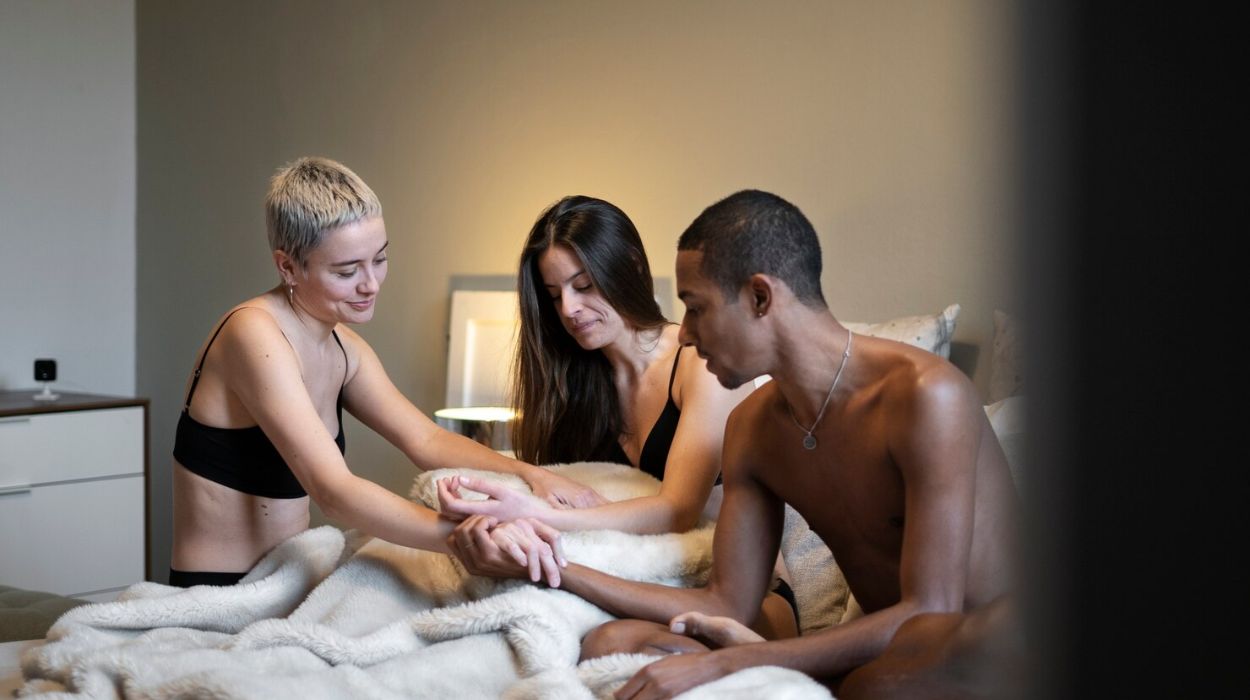
Rule 5: Have a discussion about who you hook up with
Open relationships do not necessarily mean being open to everyone. Your partner might want to get intimate with people they already know while you might be uncomfortable with the idea that you might run into those people and create an awkward social situation. For example, consider these questions:
- Is it cool to hook up with one of your partner’s classmates from high school?
- Or the boss from the company where your partner worked before?
- Is getting personal with a Facebook friend okay?
- Are Tinder dates cool?
Whatever your preferences be, discussing it with your partner might save the ugly arguments later.
Related Reading: 200+ Creative Responses To “I Love You”
Rule 6: Acknowledge jealousy
Ah, the green monster that creeps up on us even in the most stable of relationships. It’s hard enough in a monogamous relationship, but when there are multiple bodies (and hearts) involved, that creeping, toxic jealousy is bound to come into the picture. And no, one of the rules for an open relationship is not “You can’t be jealous”.
Like all matters pertaining to relationships, you’re not going to be able to organize your open relationship into a neat Excel sheet, no matter how many open relationship rules you make and discuss. You’re dealing with people and feelings, and it’s going to get messy. Here’s what you do instead:
- Express feelings of jealousy when they rise up, instead of suppressing it
- If your partner expresses such concerns, validate their feelings instead of trivialising them
- Work together to create strategies for managing jealousy, such as setting time aside for quality moments with your primary partner.
Related Reading: 11 Ways To Improve Communication In Relationships
Rule 7: Don’t neglect your primary partner
Assuming you have one primary partner, it’s always a great idea to remind them that you adore them. Gentle reminders every day about how much you love them will make the open relationship thrive. There might be doubts in your partner’s mind about losing you to someone else, so it is important to tell them you want them fully in your life – sex or no sex, monogamous or non-monogamous.
Our open relationship advice will be to:
- Go out on regular dates to feel close with your primary partner
- Bring them gifts
- Go on holidays
- Make them feel wanted and cared for
“My primary partner is fairly relaxed about our open relationship, but let’s face it, we’re terribly conditioned to feel undermined in a relationship if we’re not the ‘one and only’,” says Brian, a reader from New Orleans, “We realized pretty quickly that if dating someone in an open relationship, you’ve got to make your primary partner feel special. So, once every few months, we go on a little love-moon (we’re not married so we don’t say honeymoon), and just focus on each other.”

Rule 8: Avoid exploiting one-sided open relationships
As mentioned before, one-sided open relationships are particularly delicate to maintain as the partner not engaging with others is more prone to feelings of jealousy. Here are some things you should keep in mind to maintain a healthy relationship:
- Both partners consent to the arrangement freely instead of feeling coerced into accepting it
- Make sure the other partner doesn’t feel left out
- Have a regular conversation addressing any changes in feelings
Related Reading: Different Types Of Relationships: Find Out Yours
Rule 9: Stay flexible with boundaries
Remember that no boundaries are set in stone. People grow, feelings change and relationships evolve. And so, the needs and boundaries of each partner can also change. Regularly revisit and adjust agreements to ensure mutual comfort, especially in one-sided open relationships. These conversations may include:
- Expanding boundaries: “We’ve been doing this for a year. Are you comfortable exploring emotional relationships now?”
- Adjusting limits: “I think I’d prefer if we didn’t have overnight stays with other partners anymore.”
- Periodic check-ins: “Let’s revisit our rules every three months to see if they still work for both of us.”
Rule 10: Be prepared to exit if it doesn’t work out
No matter how long you have been dating or been together, getting into an open relationship is a different ball game altogether. It does not necessarily suit everyone. If there are too many issues cropping up in your relationship, you might want to back out of it. Revisit it when you both have the same mindset. Remember, you’re not getting into an open relationship because it’s ‘cool’ or ‘trendy’. Closing an open relationship or breaking up from your partner because of need-incompatibility doesn’t make you uptight or boring.
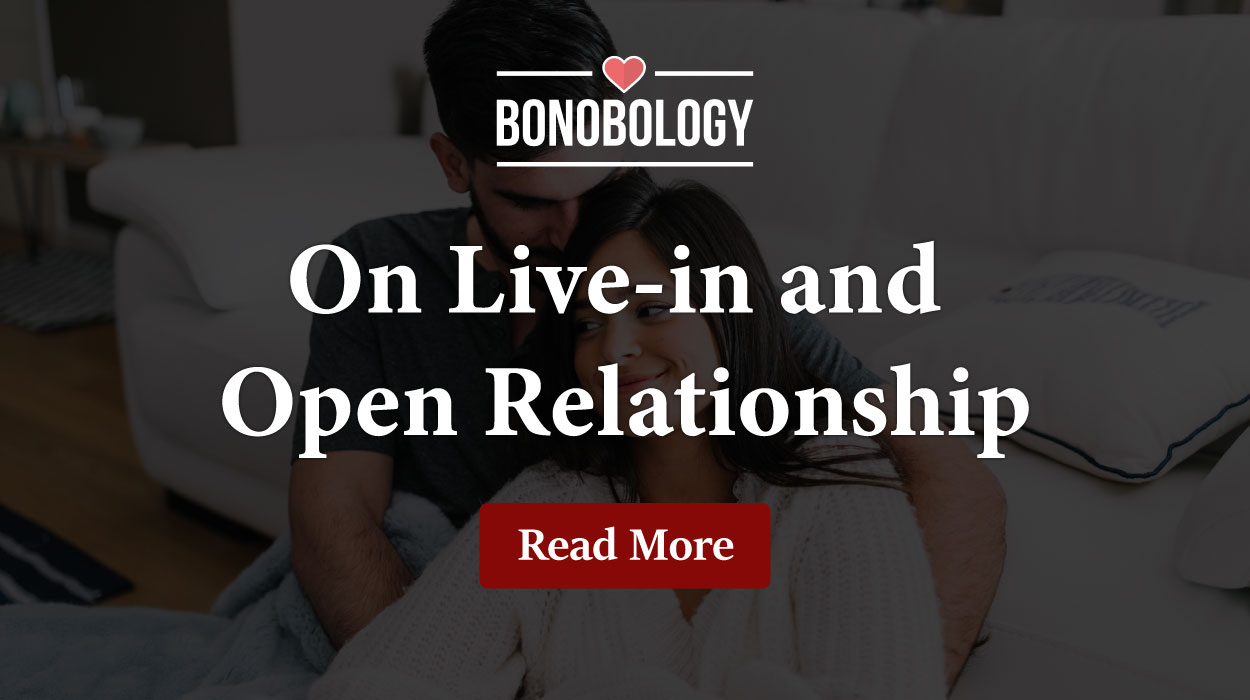
Dos And Don’ts Of Open Relationships
Now that you know the open marriage (or relationship) rules, you might have a better idea of how to go about yours. Still, there are a few things that can go wrong without you even realizing how you messed up. Take a look at this list of dos and don’ts so you can avoid a major faux pas that might just ruin things for you.
| Dos | Don’ts |
| Be honest about your intentions and why you want an open relationship | Do not lie about the number of partners you have or what you do with them |
| Establish a strong foundation of trust, support, love, honesty, and communication in your primary relationship | Do not get into an open relationship hoping to fix all the problems that your monogamous relationship is facing |
| Clarify your boundaries, limitations, expectations, and feelings | Don’t assume anyone’s boundaries and expectations, they might be very different from yours |
| Talk about everything — right down to the very last detail, if that’s what you both want | Don’t talk about the things that your partner(s) has specifically requested you to not share |
| Talk about how much time (of course, tentatively) you’re going to give to the primary partner and to the lovers | Don’t assume that a ‘schedule’ will fall into place |
| Talk about who is off-limits | Don’t assume that your sexual partners are okay with being ‘outed’. Anonymity could be important to some |
| Do accept jealousy as a normal emotion | Don’t hate your partner or shame them for being jealous |
Key Pointers
- A Pisces man values emotional depth, so be empathetic and open with him.
- When he acts distant, be patient and give him the space he needs.
- Follow through on your words and actions as consistency builds trust.
- Understand his fantasies and show respect for his dreams and aspirations.
- Be proactive in supporting his emotional and physical needs.
FAQs
1. How to ask for an open relationship?
If you’re in a monogamous relationship and want to ask your partner for an open relationship, you must be honest about what exactly you want, and why you want it. If your partner agrees with you, things will work out. However, if things go the other way and they’re not on board, there may be a few things that you both need to talk about, like why you need an open relationship and how important that need is for you, whether your partner is ready to unlearn their conditioning, and whether you already have feelings for someone.
2. Is an open relationship healthy?
If the foundation of trust, respect, support, love, and honesty is strong, there’s no reason that an open relationship cannot be healthy. Setting clear boundaries and discussing expectations about the whole experience can also greatly help deliver an overall healthy experience.
Final Thoughts
An open relationship cannot thrive on shaky grounds. If there are problems in the relationship already, bringing other people in it will, in all probability, make it worse. A marriage or a relationship cannot be saved by transitioning into an open relationship. Instead, the effort should be to bring back the couple’s communication, empathy, and sensitivity first. Once that is established, a couple can venture into an open relationship if they still want to.
What Is An Open Marriage And Why Do People Choose To Have One?
13 Things You Should Know About NSA (No-Strings Attached) Relationships
Couples Therapist Talks About The Pros And Cons Of Open Relationships
Your contribution does not constitute a charitable donation. It will allow Bonobology to continue bringing you new and up-to-date information in our pursuit of helping anyone in the world to learn how to do anything.



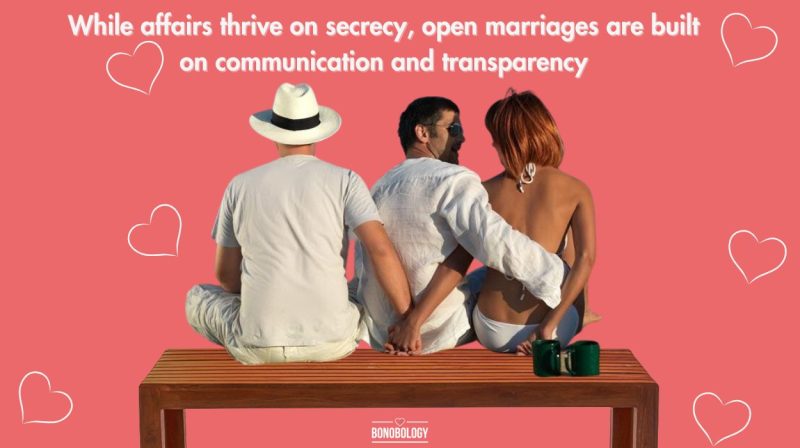
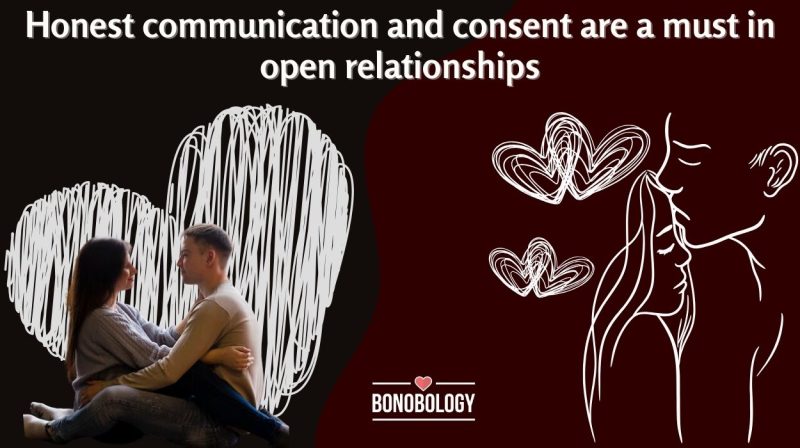

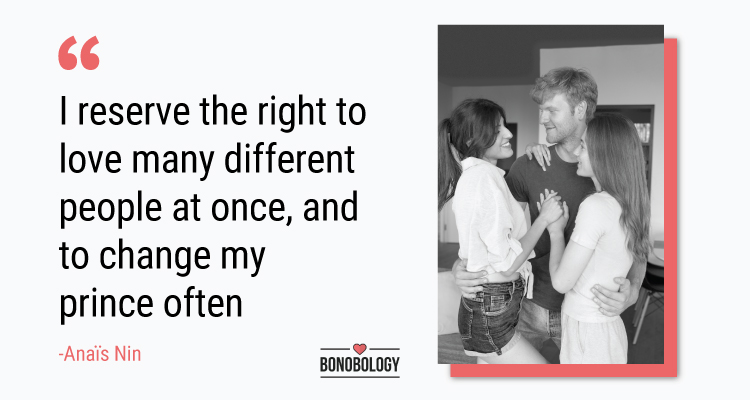


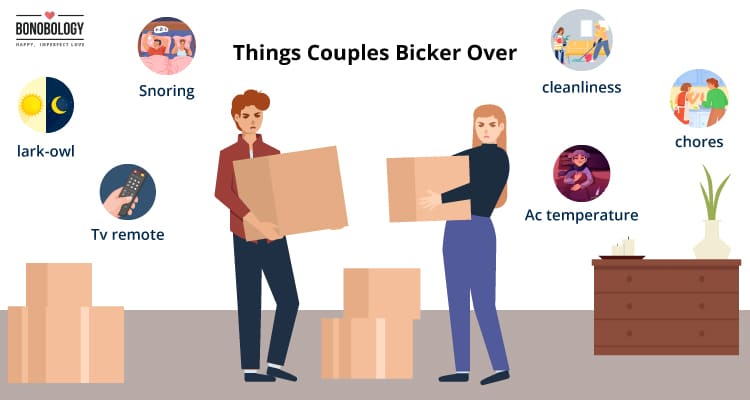












Featured
My Wife Wants Open Marriage: 17 Tips To Navigate
Open Relationship Dating: What It Is & Why It Works
13 Glaring Red Flags Before Moving In Together You Should Never Ignore
Polyamory Vs Open Relationship – 8 Key Differences (And Some Similarities)
Polyamorous Vs Polygamy – Meaning, Differences, And Tips
How To Make A Polyamorous Marriage Work? 6 Expert Tips
Are You Moving In Together? Checklist From An Expert
21 Expert Tips For Couples Moving In Together
Non-Monogamous Relationship: Meaning, Types, Benefits
Decorating Tips For Couples Moving In Together
How Soon Is Too Soon To Move In Together?
Cohabitation – Everything You Need To Know About It
Does A Friends With Benefits Relationship Actually Work?
Tips To Ease Moving In With Your Boyfriend
Does Living Together Before Marriage Mean You Are Ready For The Wedding?
Marriage VS Live-In Relationship: Everything You Wanted To Know
What Are The Disadvantages Of Live-In Relationships?
5 Things To Consider Before Beginning A Polyamorous Relationship
7 Creative Ways To Ask Your Girlfriend To Move In With You
My friend invited me to his house and I fell in love with his wife